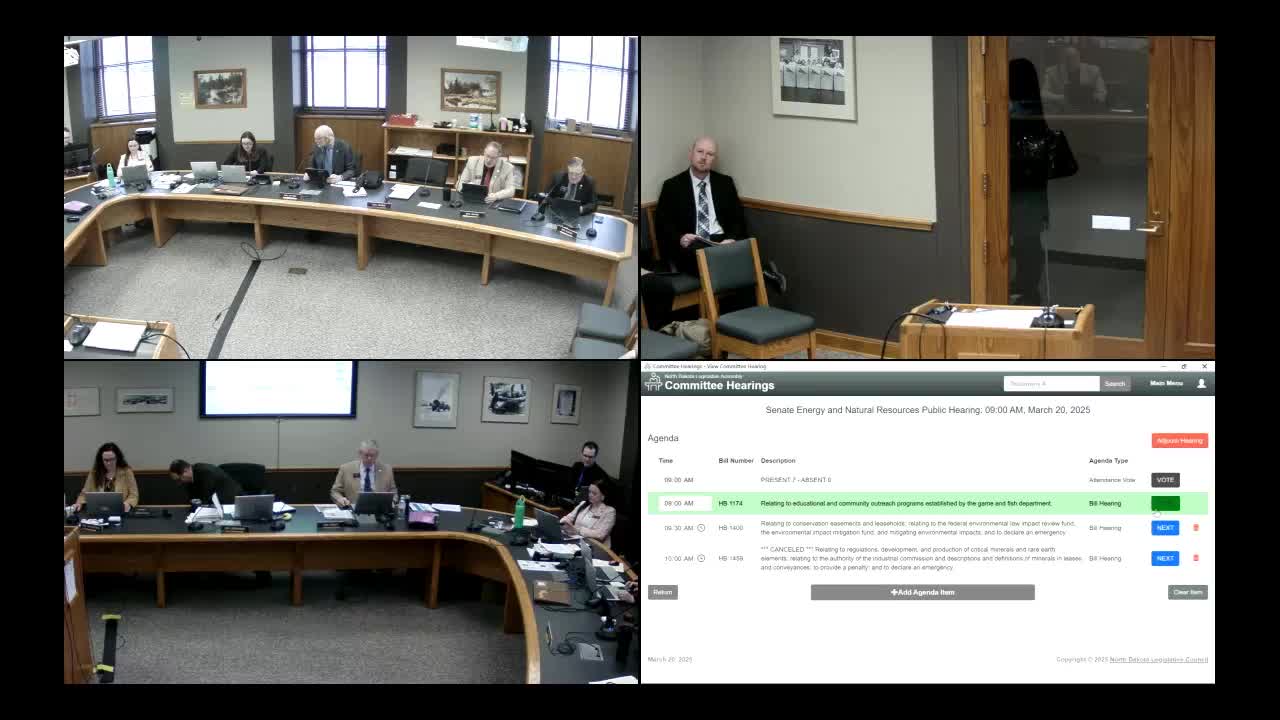Senate committee advances bill letting Game and Fish run student job‑shadowing programs
Get AI-powered insights, summaries, and transcripts
Subscribe
Summary
The Senate Energy and Natural Resources Committee gave House Bill 1174 a due‑pass recommendation after hearing that the bill would authorize the North Dakota Game and Fish Department to run educational outreach and job‑shadow programs aimed at recruiting future seasonal and permanent staff.
House Bill 1174, which would authorize the North Dakota Game and Fish Department to establish educational and community outreach programs including student job‑shadowing, won a due‑pass recommendation from the Senate Energy and Natural Resources Committee by a 5‑0 vote with two members absent.
The bill, introduced to the committee by Representative Donald Longyear on behalf of the Game and Fish Department, would give the department clear statutory authority to conduct job‑shadowing activities and other outreach to promote fisheries and wildlife management careers. Representative Longyear told the committee the department “did not have the ability to have students' job shadow,” and that creating a statutory program would expose high‑school students to agency functions and potential careers.
Why it matters: Committee testimony said seasonal hires are critical to field work and to the department’s long‑term hiring pipeline. Bill Haas, assistant wildlife chief for the North Dakota Game and Fish Department, told senators the department relies heavily on seasonal employees and that “68% of our biologists and game wardens did work for our agency in the seasonal position.” Testimony also said applications for seasonal positions fell by more than 70% between 2014 and 2022, and the department hopes hands‑on experiences will encourage students to pursue natural resources degrees.
Committee discussion and details: Testimony described the kinds of activities the program could include — “early morning pheasant survey counts, or fish spawning to provide eggs to our fish hatchery,” Haas said — and noted that participants could be involved in field activities and limited ride‑alongs with staff “in compliance with established program guidelines.” Senators pressed staff on liability and logistics; Haas said the department would work with risk management and expected a waiver or release would be part of program design, and that any school credit would be decided by the local school or district rather than required by the department. On whether students would earn school credit, Haas said, “it probably be up to each school” and that some summer seasonal staff later arrange college credit through internships.
Risk and scope: Committee members asked about occupational hazards for high‑school participants. Haas described the anticipated exposures as “slight risk, but pretty minimal,” citing examples such as riding in a boat for spawn work or limited rides in state fleet vehicles during pheasant surveys. He said the department has not yet decided whether ride‑alongs with law enforcement staff would be included and that the program will be developed with risk management input.
Vote and next steps: Senator Inghitt moved a due‑pass recommendation and Senator Behm seconded. The clerk recorded 5 ayes, 0 nays, and 2 absent not voting; the motion passed. The committee closed the hearing on HB 1174 and forwarded the bill with the recommendation.
The department and bill supporters said the statutory authority would primarily be used to recruit seasonal workers and to provide early career exposure; no appropriation or funding detail was specified during the hearing.
